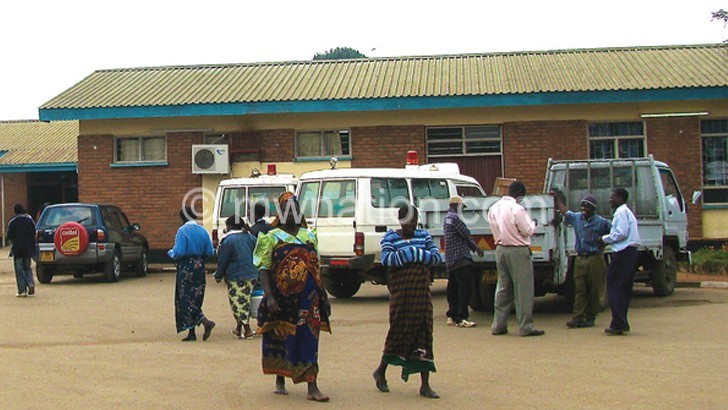Blackouts put patients’ lives in danger at Dedza District Hospital
As the nation continues to grapple with extended hours of power blackouts, authorities at Dedza District Hospital were during the Easter holiday forced to shut down incubators and other life supporting machines as it could not afford to run them on generators.
Confirming the development in an interview on Monday, Dedza district commissioner Ellis Tembo, controlling officers for all district finances, said the problem was necessitated by lack of funding as the council had not yet received its March funding, leaving the hospital with no money to buy fuel and consequently resulting into the shutting down of the incubators which assist newly-born babies and other life supporting machines for critical patients.

Tembo said approximately, the hospital which receives about K57 million funding per month, uses up to K8 million for fuel a month to run its gensets in times of blackouts.
Explained Tembo: “We are still negotiating with the Treasury for the March funding and we are hopeful that by the end of this week we will get the funding. In trying to save the situation, we borrowed the hospital K1.5 million two weeks ago to buy fuel but again they have exhausted the money due to extended load shedding hours.”
Tembo further said as a council they tried to approach some non- governmental organisations (NGOs) working in the district but they were yet to commit themselves to saving the situation.
“However, if the problem continues, we will have to go back to the filling stations to negotiate if they can help us with fuel on credit as we wait for the funding to come in,” he added.
This comes on the wake of Electricity Supply Corporation of Malawi (Escom)’s promise that selected public facilities such as hospitals will be exempted from the scheduled Easter load shedding which in some circumstances went up to 18 hours.
Escom’s spokesperson George Mituka told The Nation last week the corporation always prioritize public facilities such as hospitals, water pumping stations, State residences and barracks to make sure they are not highly affected.
Commenting on the matter, Malawi Health Equity Network (Mhen) executive director George Jobe said even though the hospital has not yet recorded any death due to the electricity challenge, the situation is life threatening as shutting down the machines may result in death of those whose lives depend on the machines.
Jobe highlighted the need for government to look for funding or call parliament to convene and find an immediate solution to the challenge.
Said Jobe: “This is a sad situation and it is happening in many district hospitals. This is why as Mhen during the Mid-Year Budget Review, we lobbied that government should increase its budget allocation to hospitals considering that issues such as pur hasing of fuel were not budget for in the previous budget.”
He reiterated the call for Escom to spare public hospitals when coming up with load shedding schedules.
For his part, Ministry of Health spokesperson Joshua Malango said due to decentralization, the issue of funding in hospitals is handled by district councils as funding goes straight from the Treasury to councils.
“As a ministry we now concentrate much on issues of quality service delivery and policy, ” he said.
Malango further said, the ministry already agreed with Escom which gave them an assurance that central hospitals will be spared from extended hours of load shedding.
Escom, last week announced an increased load shedding schedule during Easter holidays following major maintenance works at Nkula B Hydro Power Plant carried out by the Electricity Generation Company (Egenco) resulting into the shutting down of their machines from 23:59 hours on Thursday March 29 to 17:00 hours on Tuesday April 3.





